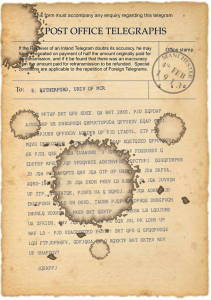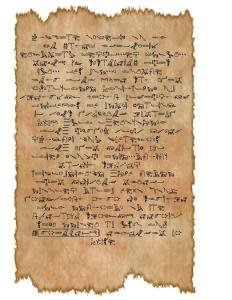Let’s get the shameless plug out of the way first…
 On November 14th, `The Imitation Game’ – a biopic about the codebreaker, mathematician and computer scientist Alan Turing, and starring Benedict Cumberbatch in the lead role – is released in cinemas. To promote the film, StudioCanal together with the School of Mathematics at the University of Manchester are running a cryptography competition based on Alan Turing and set around Bletchley Park. Prizes include film posters signed by the principal cast, soundtracks, DVD bundles, day passes to Bletchley Park, etc. The competition, which runs until November 28th, is open to everybody and can be found here.
On November 14th, `The Imitation Game’ – a biopic about the codebreaker, mathematician and computer scientist Alan Turing, and starring Benedict Cumberbatch in the lead role – is released in cinemas. To promote the film, StudioCanal together with the School of Mathematics at the University of Manchester are running a cryptography competition based on Alan Turing and set around Bletchley Park. Prizes include film posters signed by the principal cast, soundtracks, DVD bundles, day passes to Bletchley Park, etc. The competition, which runs until November 28th, is open to everybody and can be found here.
Ok, advert over, so let’s talk about how and why we got involved in this…
Starting in 2012, the School of Mathematics at the University of Manchester has been running `The Alan Turing Cryptography Competition’. Unlike the Imitation Game competition, this is open only to schoolchildren in Year 11 or below. We’re aware that many children are turned off mathematics at a young age as they equate it with `doing hard sums’ and often don’t get to see that it’s actually about creative problem solving and logical thought. The competition is a way of addressing this. In fact, we deliberately make sure that the codes in the competition can be solved bare-handed (without recourse to computer programming or even GCSE-level mathematics) – provided that you can `think-outside-the-box’!
Each year the competition is themed either around some aspect of Turing’s life and work or the University, often incorporating perhaps less-well-known facts. One example (and one which we  revisited for the Imitation Game competition) is that, in 1940, whilst Turing was working on cracking the Kreigsmarine Enigma machine at Bletchley Park, he was worried that if the Germans invaded the British Isles then sterling would become worthless. He converted his life-savings into silver ingots and buried them somewhere near Bletchley. Unfortunately, he subsequently forget where – and they are (presumably) still there, likely buried under a housing estate in Milton Keynes!
revisited for the Imitation Game competition) is that, in 1940, whilst Turing was working on cracking the Kreigsmarine Enigma machine at Bletchley Park, he was worried that if the Germans invaded the British Isles then sterling would become worthless. He converted his life-savings into silver ingots and buried them somewhere near Bletchley. Unfortunately, he subsequently forget where – and they are (presumably) still there, likely buried under a housing estate in Milton Keynes!
We also incorporate some classical ideas or other stories relating to cryptography into the competition. One code involved solving crosswords. This was inspired by the fact that, in 1941, the Telegraph (at the behest of the War Office) organised a cryptic crossword competition; those who did well were recruited as codebreakers at Bletchley Park. Another code mimicked a `numbers station’ (a numbers station is a shortwave radio broadcast often consisting solely of a computer-generated voice reading out sequences
of numbers; they are believed to be broadcasts from governments to spies in the field).
 One reason I believe that the competition has been so successful is that cryptography is a great way to bring mathematics alive. The abstract thought processes that are needed to crack a code are very reminiscent of the skills needed to be a professional mathematician. It’s also easy to relate cryptography to the real world: from codebreakers in the 1940s slaving away late at night to crack the Enigma machine so as to defend Britain, through Turing’s own tortured personal life, to how cryptography is used by all of us whenever we send secure information (credit card details, for example) across the internet.
One reason I believe that the competition has been so successful is that cryptography is a great way to bring mathematics alive. The abstract thought processes that are needed to crack a code are very reminiscent of the skills needed to be a professional mathematician. It’s also easy to relate cryptography to the real world: from codebreakers in the 1940s slaving away late at night to crack the Enigma machine so as to defend Britain, through Turing’s own tortured personal life, to how cryptography is used by all of us whenever we send secure information (credit card details, for example) across the internet.
The Imitation Game Cryptography Competition runs until Nov 28th. Next year’s Alan Turing Cryptography Competition starts in Jan 2015, http://www.maths.manchester.ac.uk/cryptography_competition
Post by Dr. Charles Walkden